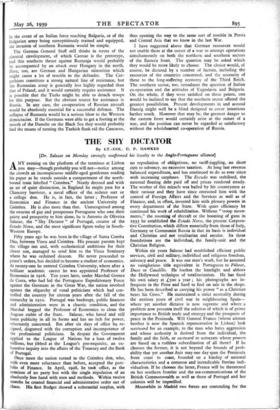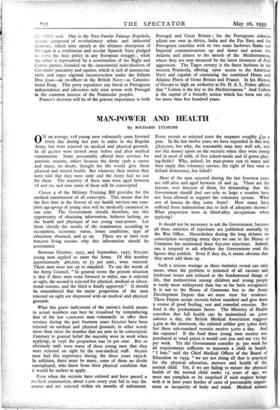THE SHY DICTATOR
By LT.-COL. C. P. HAWKES
[Dr. Salazar on Monday strongly reaffirmed his loyalty to the Anglo-Portuguese alliance] A NY evening on the platform of the terminus at Lisbon you may—though probably you will not—notice among the crowds an inconspicuous middle-aged gentleman reading his paper as he stands outside a compartment of the north- bound train labelled "Coimbra." Neatly dressed and with an air of quiet distinction, in England he might pass for a Chancery barrister, a naval officer of the sedater sort or a college don. He is, in fact, the latter ; Professor of Economics and Finance in the ancient University of Coimbra. He is also more than that. Unrecognised among the swarms of gay and prosperous Portuguese who owe their gaiety and prosperity to him alone, he is Antonio de Oliveira Salazar, the "Shy Dictator" of Portugal, creator of the Estado Novo, and the most significant figure today in South- Western Europe. you may—though probably you will not—notice among the crowds an inconspicuous middle-aged gentleman reading his paper as he stands outside a compartment of the north- bound train labelled "Coimbra." Neatly dressed and with an air of quiet distinction, in England he might pass for a Chancery barrister, a naval officer of the sedater sort or a college don. He is, in fact, the latter ; Professor of Economics and Finance in the ancient University of Coimbra. He is also more than that. Unrecognised among the swarms of gay and prosperous Portuguese who owe their gaiety and prosperity to him alone, he is Antonio de Oliveira Salazar, the "Shy Dictator" of Portugal, creator of the Estado Novo, and the most significant figure today in South- Western Europe.
Fifty years ago he was born in the village of Santa Comba Mc), between Vizeu and Coimbra. His peasant parents kept the village inn and, with ecclesiastical ambitions for their clever son, managed to send him to the Vizeu Seminary where he was ordained deacon. He never proceeded to priest's orders, but decided to become a student of economics. At twenty-one he entered Coimbra University, where after a brilliant academic career he was appointed Professor of Economics in 5956. Ten years later, under Marshal Gomez da Costa, who had led the Portuguese Expeditionary Force against the Germans in the Great War, the nation revolted against the oligarchy of venal politicians which had con- trolled the country for sixteen years after the fall of the monarchy in 5950. Portugal was bankrupt, public finances and administration were in a chaotic condition, and the Marshal begged the Professor of Economics to clean the Augean stable of the State. Salazar, who hated and still hates publicity in all its forms and has no itch for power, reluctantly consented. But after six days of office he re- signed, disgusted with the corruption and incompetence of the professional politicians. In despair the Government applied to the League of Nations for a loan of twelve millions, but jibbed at the League's pre-requisite, an ex- haustive inquiry into the affairs of the Treasury and the Bank of Portugal.
.Once more the nation turned to the Coimbra don, who, with even more reluctance than before, accepted the port- folio of Finance. In April, 5928, he took office, as the nominee of no party but with the single stipulation of an absolutely free hand with men and methods. Within twelve months he created financial and administrative order out of chaos. His first Budget showed a substantial surplus, with no repudiation of obligations, no tariff-juggling, no short cuts to solvency, no excessive taxation. At long last revenue balanced expenditure, and has continued to do so ever since with increasing surpluses. The Escudo was stabilised, the external floating debt paid off and prices rendered steady. The worker of this miracle was hailed by his countrymen as their saviour and they have since entrusted him with the control of Foreign Affairs and the Services as well as of Finance, and, in effect, invested him with plenary powers in every department of the State. With quiet efficiency he continued his work of rehabilitation. Without "troop move- ments," the zooming of aircraft or the booming of guns in 5933 he established the Estado Novo, the present Corpora- tive Constitution, which differs essentially from those of Italy, Germany or Communist Russia in that its basis is individual and Christian and not totalitarian and secular. Its three foundations are the individual, the family-unit and the Christian Religion.
Within six years Salazar had established efficient public services, civil and military, individual and religious freedom, solvency and peace. It was one man's work, but he assumed no vainglorious title equivalent in Portuguese to Fiihrer, Duce or Caudillo. He loathes the limelight and abhors the Hollywood technique of totalitarianism. He has fixed his own salary at £500 a year ; his photographs are in- frequent in the Press and hard to find on sale in the shops. He has been described as carrying his power "as a Christian bears his Cross." He maintained a strict neutrality during the anxious years of civil war in neighbouring Spain— where yet another dictator is now supreme and where a problem now presents itself the solution of which is of prime importance to British trade and strategy and the prospects of peace in the Peninsula. Will General Franco (whose airman brother is now the Spanish representative in Lisbon) look westward for an example, to the man who hates aggression and whose authority is derived from the individual, the family and the faith, or eastward to autocrats whose powers are based on a ruthless subordination of all three? If he chooses the former, it is not beyond the bounds of prob- ability that yet another Axis may one day span the Peninsula from coast to coast, founded on a kinship of national characteristics and a common and ineradicable Iberian indi- vidualism. If he chooses the latter, France will be threatened on her southern frontier and the sea-communications of the British Commonwealth as well as those of Portugal and her colonies will be imperilled.
Meanwhile in Madrid two forces are contending for the jillo's soul. One is the Nazi-Fascist Falange Espanola, mainly composed of revolutionary urban and industrial elements, which aims openly at the ultimate absorption of Po-tugal in a totalitarian and secular Spanish State pledged to assist the Axis policy in any European struggle ; while the other is represented by a combination of the Right and Centre parties, founded on the immemorial individualism of Cervantes' peasantry and squires, which is sick of internecine strife and urges regional reconstruction under the Infante Don Juan—an ex-officer in the British Navy—as Constitu- tional King. This party repudiates any threat to Portuguese independence and advocates only joint action with Portugal In the common interest of the Peninsular peoples.
Franco's decision will be of the gravest importance to both Portugal and Great Britain ; for the Portuguese colonies adjoin our own in Africa, India and the Far East, and the Portuguese coastline with its two main harbours flanks our Imperial communications up and down and across the Atlantic and almost to the mouth of the Mediterranean, where they are nolv menaced by the latest instances of Axis aggression. The Tagus estuary is the finest harbour in the western Peninsula, offering open access to the American Navy and capable of containing the combined Home and Atlantic Fleets of Great Britain and France. In his History of Europe so high an authority as Dr. H. A. L. Fisher affirms that "Lisbon is the key to the Mediterranean." And Lisbon is the capital of a friendly nation which has been our ally for more than five hundred years.



























































 Previous page
Previous page